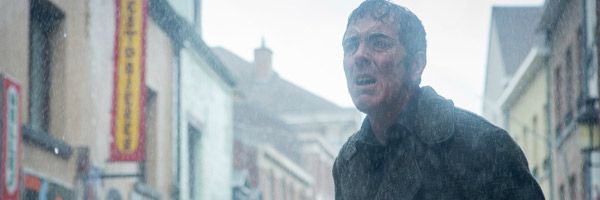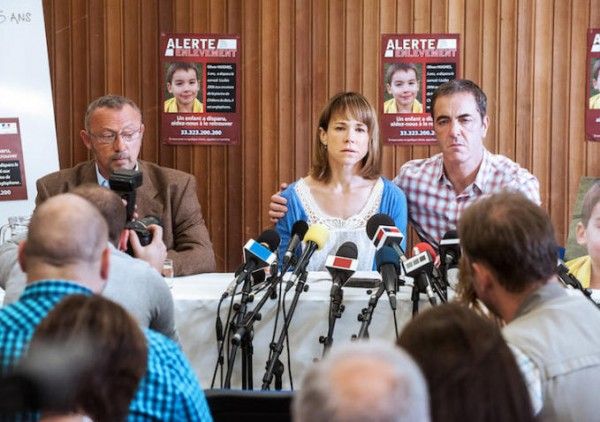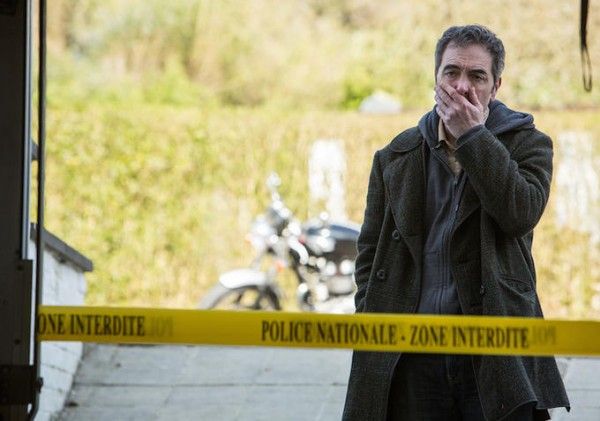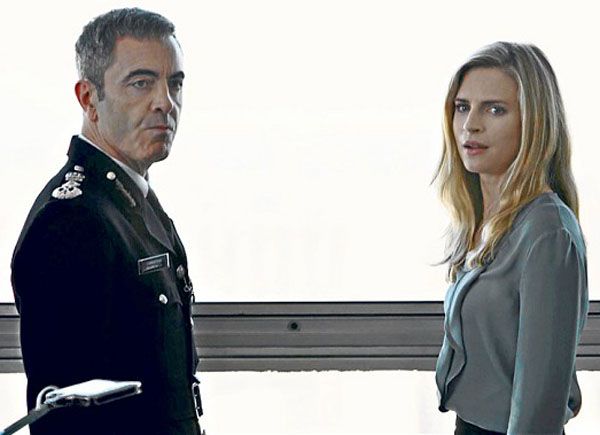The chilling new Starz drama series The Missing follows the aftermath of what happens when five year-old Oliver Hughes disappears while on holiday in France with his parents. As you descend deeper into the mind of a father (James Nesbitt) desperate to locate his lost son, and getting help from a now retired detective (Tchéky Karyo), you follow the obsessive, nearly decade-long search to find his son and those responsible for his disappearance.
During this exclusive interview with Collider, actor James Nesbitt talked about how The Missing came about for him, why this story and character really stayed with him, balancing the two time frames (2006 and 2014) that the narrative is told in, the guilt that drives his character, the most challenging scenes to shoot, and how the story didn’t turn out anything like what he expected. He also talked about the experience of doing Danny Boyle’s first TV series Babylon with Brit Marling, and what’s it like to be a part of The Hobbit films (he plays Bofur). Check out what he had to say after the jump, and be aware that there are some spoilers.
Collider: How did you come to this?
JAMES NESBITT: I was in New Zealand for a long time doing The Hobbit, and I shot a little independent Irish film called Gold. I wasn’t actively looking for something, but I guess my agent was. She said, “I’m sending you something that I think is quite special.” She sent four scripts that I read, and it was so immediately arresting with this horrendous story, in terms of what happens, so I went up for it. I met (director) Tom [Shankland], and a couple of weeks later, I was hired. And here we are, nine months later, talking about it.
When you read this, what was it about the story and character that really stayed with you?
NESBITT: Because it’s about the very worst that can happen, and the worst that we can be. It’s about loss, and yet it’s about hope. It’s about guilt. It’s about the destruction of a family. It’s about the human spirit, in a way. It just had everything. It was a challenge and a privilege, but it was also clearly going to be an intimidating and grueling process, trying to sustain something for that length of time. Because Oliver disappears so early on, I knew we were going to spend five months going to a pretty dark place, every day. The fact that we were separated and isolated in Brussels was very helpful. I wasn’t going to my daughters every night. I would see them on the weekend, which was timely because, after five days of shooting, I needed to connect. But, to be able to sustain it was important. I didn’t live in a hotel. I lived in an apartment by myself, and I had all of the stuff Tony had, around the apartment. I had Oliver’s pictures on the walls. I tried, very much, to live in that world. So, it was a privilege to play, but it was grueling. It would be a lie to say that it wasn’t grueling.
This is not really one of the times that you want to draw for your own life for a role.
NESBITT: I would have thought that I would have leaned heavily on my own parenting, but I actually couldn’t really with this. If you try to do that, or you try to imagine it, you can’t locate it. What you can locate with being a parent is the pain that Tony must have felt. To really be able to sustain it, I located Tony very early on and would just be in the moment, the whole time. That took me to the places that I needed.
What was it like to work with Frances O’Connor, on these two time frames?
NESBITT: We shot 2014 first, and the more we were in the dark places and at each other, as Tony and Emily were torn apart, Fran and Jimmy became closer because we had to support each other. There was no way of getting through it, otherwise.
What was it like to work with Tchéky Karyo, and develop the dynamic between Tony and Julien Baptiste?
NESBITT: We’re such an odd couple, in a sense, but so rely on each other. There’s a love between them, as well. In 2006, they spend very little time together, and what time they do spend, there are tough interrogations. This was Baptiste’s last case, that was never resolved successfully, so they become reliant upon each other in 2014. I love the idea of these two desperate souls who become connected and find a relationship that is rather precious and tender.
Do you think it’s because Tony was there when his son went missing that he’s become so obsessed, instead of just shutting off?
NESBITT: It’s guilt. Imagine how many times he must play that scene over in his head. Why did the team score, at that moment? Why did I go for the drink, just at that moment? Why couldn’t I have waited just a little bit longer? Why couldn’t I have gone for a drink earlier? He’s played that reel of footage over and over in his mind, for years and years. That’s what keeps him going. I feel for him.
Were there any moments or scenes that were particularly challenging to shoot, or was it just the entire shoot that was challenging?
NESBITT: There were scenes with Fran that were really tricky because we really had to go to the absolute limits, and that’s painful. Tony loves Emily, and we liked each other, and there were days when we were pretty hard on each other. It’s a complicated jigsaw. There were days that were really difficult.
Once you learned how this story would end up, was its conclusion anything like what you expected it would be, when you started reading it?
NESBITT: No, nor will it be for you. If you think about the analogy of the pebble being dropped into the pond and all of those ripples, the ramifications go on forever. It’s not just about a mother and father, and a child going missing. It’s about the impact it has on everyone. And there’s a thriller element, too. Tom and I were constantly talking, on camera and off camera, and over the weekends when we were apart. Just being in the moment, what would he do? Where’s he going? What’s he thinking? There’s that sense of isolation, so I was pretty cooped up. We were very united in our responsibility to the story and trying to tell it truthfully. I think we felt a responsibility to Oliver. We all felt desperate for that little boy. When we got to 2006, we had already shot all of the 2014 stuff. So, we had bonded so well, as actors, that by the time we got to 2006, we were able to present this family that was together, and then we were able to play the immediate aftermath and horror of losing your child.
How satisfied were you with the way that the story ended, and how satisfied do you think audiences will be?
NESBITT: Well, that’s quite a naughty question. I don’t know. It’s hard to answer that. Satisfaction is always tricky with a story like this. The truth of it is interesting, and I think that’s satisfying.
How was the experience of doing Danny Boyle’s first TV series, Babylon?
NESBITT: There were actually a couple of weeks when I was filming Monday through Friday in Brussels [on The Missing], and then taking the train back and filming Saturday and Sunday on Babylon. But it was interesting because it was a relief from The Missing, in a way. That was a pretty mad period of time, I have to say. I wouldn’t necessarily want to repeat it.
What attracted you to that project?
NESBITT: The character was so strong and the writing was so great, and then there was Danny. Jon S. Baird, who directed Filth, is a prodigy of Danny’s. The character gets pretty extreme. It’s a strong, interesting, important satire.
What was it like to work with Brit Marling?
NESBITT: She’s fantastic! She’s cool, great, intelligent and wonderful. She’s very collaborative. The best people are the ones who don’t have a hidden agenda, and they just get on with it. Brit is pretty amazing.
You did a feature-length pilot, and then individual episodes. Do they feel similar in tone?
NESBITT: I think they learned a lot from the pilot, but very much so. I only did three episodes because I was doing [The Missing], but it’s great. It’s pretty extreme.
What’s it like to be a part of The Hobbit films?
NESBITT: It was just such an experience. That’s what’s great. I took my kids to the other side of the world and they were able to be imbued with a different culture that they’ll live with, for the rest of their lives. To be one of the 13 dwarves in The Hobbit, to work with Pete [Jackson], to have a Lego man of my character is all really interesting.
Is it sad to know that the big conclusion is coming and it’s all almost over?
NESBITT: We started it nearly five years ago. I went there when I was 45, the day before my 46th birthday, and I’ll be 50 in January. My kids are in it, so that’s fun. We have one last go at it to get together for, and that will be fun. It’s been wonderful to be involved with that.
The Missing airs on Saturday nights on Starz.




